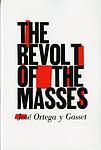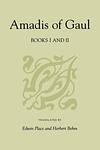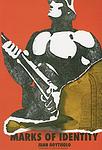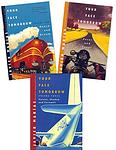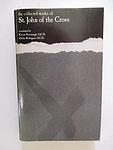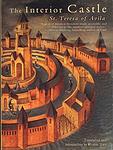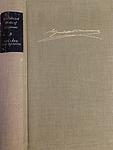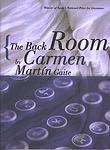The Greatest Spanish Books of All Time
Click to learn how this list is calculated.
This list represents a comprehensive and trusted collection of the greatest books. Developed through a specialized algorithm, it brings together 300 'best of' book lists to form a definitive guide to the world's most acclaimed books. For those interested in how these books are chosen, additional details can be found on the rankings page.
Genres
Countries
Date Range
Reading Statistics
Click the button below to see how many of these books you've read!
Download
If you're interested in downloading this list as a CSV file for use in a spreadsheet application, you can easily do so by clicking the button below. Please note that to ensure a manageable file size and faster download, the CSV will include details for only the first 500 books.
Download-
26. The Revolt of the Masses by José Ortega y Gasset
"The Revolt of the Masses" is a philosophical work that discusses the rise of the "mass man" and the potential danger this presents to society. The author argues that the mass man, characterized by his lack of individuality and rejection of higher values, is a product of modern society and its emphasis on equality. He believes that this mass man, who is more concerned with his rights than his responsibilities, threatens to undermine the very foundations of society, leading to potential chaos and instability. The book serves as a warning and a call for a return to individual responsibility and respect for higher values.
-
27. Amadis of Gaul by Unknown
"Amadis of Gaul" is a medieval romance that tells the story of the titular character, a knight-errant, who embarks on a series of adventures throughout the mythical kingdoms of Western Europe. Throughout his journey, Amadis encounters a variety of challenges, including enchantments, monsters, and rival knights, all while remaining steadfast in his love for Princess Oriana. The tale is known for its elaborate descriptions of chivalry, courtly love, and honor, and is considered a classic example of the chivalric romance genre.
-
28. Tirant Lo Blanc by Unknown
"Tirant Lo Blanc" is a medieval chivalric romance that follows the adventures of the titular knight as he battles Moors in North Africa, serves the Byzantine emperor, and falls in love with the emperor's daughter. The book is known for its realistic depiction of warfare and courtly love, and for its satirical commentary on the chivalric ideals of the time. The protagonist is portrayed as a more human and flawed character than the typical knights of other chivalric romances, making the story more relatable and engaging.
-
29. Time of Silence by Luis Martín-Santos
"Time of Silence" is a complex narrative that follows the life of a young doctor living in Madrid during the Franco regime. Throughout the novel, he becomes embroiled in a series of unfortunate events, including an affair with a married woman, which leads to tragic consequences. The novel is known for its innovative narrative techniques and its critical depiction of the moral and political climate of Spain under Franco's rule.
-
30. Marks of Identity by Juan Goytisolo
This novel follows the life of Alvaro Mendiola, a Spanish man returning to his homeland after a long period of self-imposed exile in France. Through his experiences and memories, the narrative paints a vivid picture of the socio-political climate in Spain under Franco's dictatorship. As Alvaro grapples with his identity, the book explores themes of personal and national identity, exile, and the struggle for freedom.
-
31. Memoirs of a Peasant Boy by Xosé Neira Vilas
"Memoirs of a Peasant Boy" is a poignant narrative about the harsh realities of rural life in Galicia, Spain during the early 20th century, as seen through the eyes of a young boy. The protagonist, who is also the narrator, offers a vivid depiction of his experiences growing up in poverty, dealing with oppressive landlords, and struggling for survival and education. This autobiographical novel is a powerful commentary on social injustice and the enduring spirit of the human will.
-
32. Journey to the Alcarria by Camilo José Cela
"Journey to the Alcarria" is a travel literature piece that takes the reader on a journey through the Alcarria region in Spain. The protagonist, a solitary traveler, explores the landscape, culture, and people of this region, offering detailed descriptions and observations. The narrative captures the essence of Spain's post-war period, revealing the harsh realities of rural life and the resilience of its people. The book is both a physical journey through a specific place and a metaphorical journey into the human condition.
-
33. Nada by Carmen Laforet
"Nada" is a novel that follows the life of a young woman who moves to Barcelona to attend university after the Spanish Civil War. She stays with her eccentric relatives who live in a grand, but decaying mansion. The protagonist struggles to find her identity and independence while dealing with poverty, repression, and the emotional instability of her relatives. The story is a powerful exploration of despair, alienation, and the loss of innocence.
-
34. Compassion by Benito Pérez Galdós
"Compassion" is a compelling narrative that explores the themes of poverty, compassion, and human morality. Set in 19th-century Spain, it follows the story of a wealthy woman who, after an encounter with a poor, blind beggar, is moved to reassess her life and the societal norms of the time. This chance meeting prompts her to question the established social order and her privileged position within it, leading to a profound personal transformation. This novel is a poignant exploration of human empathy and the societal structures that often hinder its expression.
-
35. Pepita Jimenez by Juan Valera y Alcalá-Galiano
"Pepita Jimenez" is a romantic Spanish novel that tells the story of a young widow named Pepita and her love affair with Luis, a seminary student destined for priesthood. The story unfolds in a small Spanish town and explores the themes of love, religion, and societal expectations. Despite the societal norms and his religious obligations, Luis finds himself irresistibly drawn to Pepita. The narrative delves into their inner struggles, the complexities of their relationship, and ultimately, their decision to choose love over duty.
-
36. The True History of the Conquest of New Spain by Bernal Díaz del Castillo
This book provides a first-hand account of the conquest of Mexico by the Spanish during the 16th century. It offers a detailed narrative of the events, battles, and interactions with native tribes, including the Aztecs. The author, a soldier in the Spanish army, provides a unique perspective on Hernán Cortés and his tactics, the politics of the time, and the cultural and religious practices of the indigenous people. The book also highlights the hardships, challenges, and ethical dilemmas faced by the conquistadors.
-
37. The Travels of Persiles and Sigismunda by Miguel de Cervantes
"The Travels of Persiles and Sigismunda" is a complex, multi-layered narrative that follows the journey of two noble lovers, Persiles and Sigismunda, who disguise themselves as brother and sister to escape from their homeland and travel through numerous countries. Throughout their journey, they encounter a wide array of characters and experience numerous adventures, all while maintaining their secret identities. The book is known for its exploration of love, virtue, and the human condition, with a blend of realism and fantasy.
-
38. Your Face Tomorrow: Fever and Spear by Javier Marías
The novel explores the life of a Spanish expatriate in England who is recruited by a secretive organization due to his unique ability to interpret people's behavior. As he becomes entangled in a world of espionage, he grapples with moral and ethical dilemmas, questioning the validity of his work and the consequences of his actions. Through a blend of introspective musings and suspenseful narrative, the protagonist's life unravels, revealing a complex web of deceit, betrayal, and violence.
-
39. Rimas by Gustavo Adolfo Bécquer
"Rimas" is a collection of post-romantic poetry that explores themes of love, despair, and the ephemeral nature of beauty. The poems are known for their musicality, emotion, and simplicity, and they often reflect the poet's personal experiences and feelings. The work is considered a cornerstone of Spanish literature and a major contribution to the romantic literary movement.
-
40. Juan De Mairena by Antonio Machado
"Juan de Mairena" is a collection of philosophical musings, aphorisms, and reflections on a range of topics such as politics, art, religion, and education. The work is presented as the thoughts of an imaginary character, Juan de Mairena, a teacher and amateur philosopher. Through this character, the author explores and critiques Spanish society and culture, often with a satirical edge. The book is noted for its introspective and contemplative tone, blending elements of both fiction and non-fiction.
-
41. The Poems of Jaime Gil de Biedma by Jaime Gil de Biedma
This book is a collection of poems by a renowned Spanish poet, reflecting his personal experiences, emotions, and observations of society. The poet's work is characterized by his profound exploration of themes such as love, death, time, and memory. His poems are known for their rich imagery, lyrical beauty, and philosophical depth, offering readers a unique insight into the human condition and the complexities of life.
-
42. Poems of Góngora by Luis de Góngora
"Poems of Góngora" is a collection of poems by a renowned Spanish Baroque poet. The book is a compilation of his most celebrated works, showcasing his unique style of complex and innovative metaphors, intricate syntax, and the use of Latinisms. His poems capture a wide range of themes such as love, beauty, life, and death, reflecting the cultural and social milieu of the Spanish Golden Age.
-
43. Bohemian Lights by Ramón del Valle-Inclán
"Bohemian Lights" is a novel set in early 20th century Madrid, Spain, featuring a group of bohemian artists and intellectuals as they navigate poverty, passion, and the pursuit of their crafts. The narrative captures their struggles and triumphs, the vibrant and decadent world they inhabit, and their unyielding commitment to their artistic ideals. The novel offers a vivid portrayal of bohemian life, with its blend of joy, despair, and relentless creative energy.
-
44. Last Evenings with Teresa by Juan Marse
The novel revolves around a young, ambitious man from the lower class who is obsessed with breaking into the higher social strata of Barcelona. He believes that his ticket to this higher society is through seducing Teresa, a naive, young girl from a well-off family. As he manipulates Teresa, he finds himself entangled in a web of deceit, lies, and unexpected feelings. The story is a gritty exploration of class, ambition, and the lengths people will go to achieve their desires.
-
45. Mortal y rosa by Francisco Umbral
"Mortal y Rosa" is a heartbreaking and poignant narrative about a father's grieving process after the loss of his young son. The novel is a profound exploration of death, love, and loss, with the author using beautiful, poetic language to express his deep sorrow and pain. It is not just a lamentation, but also a reflection on life, childhood, and the fleeting nature of time. The book is a testament to the power of words in expressing the inexpressible and a moving tribute to a life cut tragically short.
-
46. The Collected Works of St. John of the Cross by St. John of the Cross
This book is a comprehensive collection of works by a renowned Spanish mystic and Carmelite friar. It includes his well-known poems, commentaries, and spiritual treatises, providing a deep exploration of his thoughts on the soul's journey to union with God. The writings delve into the concept of the 'Dark Night of the Soul', a period of spiritual desolation that leads to profound enlightenment, and offer a profound insight into Christian mysticism and spiritual growth.
-
47. The Interior Castle by Teresa of Avila
"The Interior Castle" is a spiritual guide that uses the metaphor of a castle with seven chambers, or 'mansions', to explain the journey of faith. The author describes each mansion as a step closer to God, with the innermost chamber representing union with the divine. The book explores various spiritual concepts such as self-knowledge, detachment, humility, and divine love, providing a roadmap for personal transformation and spiritual growth.
-
48. The Poems Of St. John Of The Cross by John of the Cross
The book is a collection of mystical poetry written by a 16th-century Spanish monk who explores the profound depths of Christian spirituality and the soul's journey towards union with God. Through his lyrical verses, the author delves into themes of love, suffering, and the quest for spiritual purification and enlightenment. His poems are celebrated for their rich imagery and emotional intensity, reflecting his own experiences and the contemplative life. The work is considered a pinnacle of Spanish literature and a significant contribution to Christian mysticism, offering readers a path to understanding the complexities of the divine and the inner workings of the soul.
-
49. Our Lord Don Quixote by Miguel de Unamuno
The book presents a philosophical and introspective analysis of the classic literary character Don Quixote, delving into the existential and moral dimensions of his adventures. The author reflects on the nature of reality, the importance of ideals, and the interplay between sanity and madness, arguing that Quixote's chivalric quests and his refusal to concede to the limitations of his mundane world embody a profound and heroic affirmation of human imagination and spirit. Through this exploration, the work becomes a meditation on the human condition and the enduring power of fiction to inspire and give life meaning.
-
50. The Back Room by Carmen Martín Gaite
"The Back Room" is a surreal narrative that blurs the lines between reality and imagination. The story revolves around a female writer who is visited by a mysterious stranger in the middle of the night. The stranger triggers a series of memories and dreams, transporting her back to her childhood during the Spanish Civil War. As the protagonist delves deeper into her past, she begins to question the nature of her reality, resulting in a psychological exploration of memory, identity, and the power of storytelling.
Reading Statistics
Click the button below to see how many of these books you've read!
Download
If you're interested in downloading this list as a CSV file for use in a spreadsheet application, you can easily do so by clicking the button below. Please note that to ensure a manageable file size and faster download, the CSV will include details for only the first 500 books.
Download